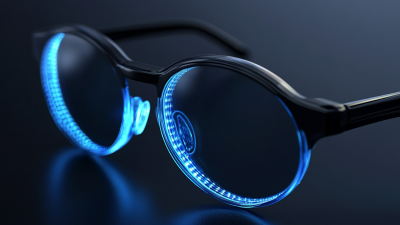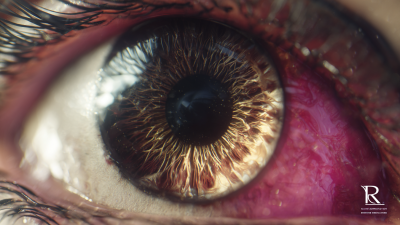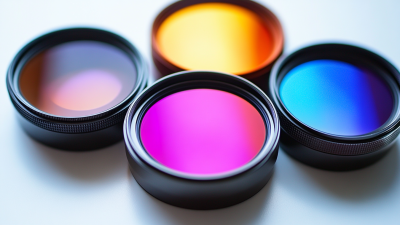In the ever-evolving world of optics, spherical lenses have emerged as a pivotal solution for various visual needs, making significant contributions to both eyewear and optical devices. According to a report by the American Optometric Association, approximately 75% of adults use some form of vision correction, highlighting the increasing reliance on optical technology. Spherical lenses, characterized by their uniform curvature, offer distinct advantages in improving visual acuity and comfort. A study published in the Journal of Optometry found that lenses with a spherical design can enhance depth perception and reduce distortion, making them ideal for everyday use. As we delve into the seven remarkable benefits of spherical lenses, it becomes clear how essential they are for meeting diverse visual requirements, whether for prescription glasses, contact lenses, or advanced optical instruments.

Spherical lenses are an essential component of modern optics and play a crucial role in enhancing visual clarity. The science behind these lenses lies in their curved design, which allows them to focus light more effectively than flat surfaces. According to a report by the Optics and Photonics Industry Association, over 90% of eyeglasses and contact lenses incorporate spherical designs to correct various vision impairments. The curvature of spherical lenses enables them to converge or diverge light rays optimally, resulting in clearer images for both nearsighted and farsighted individuals.
To maximize the benefits of spherical lenses, it’s important to understand your visual needs. Regular eye exams are recommended to determine the precise curvature required for optimal vision correction. Additionally, consider exploring coatings like anti-reflective or blue light blocking, which can further enhance your visual experience, particularly in today's digital age. A study from the American Academy of Optometry indicates that users of blue light blocking lenses reported a 30% reduction in eye strain from prolonged screen exposure.
Another tip is to invest in high-quality spherical lenses, as they are crafted to meet specific vision standards. The Amsler grid, frequently used in clinical settings, can serve as a simple tool to monitor vision and detect changes over time. Being proactive about your vision can help in tailoring your spherical lenses for the best possible visual outcome.

Spherical lenses are increasingly recognized for their exceptional ability to enhance clarity and precision in vision correction. By providing a uniform curvature across their surface, these lenses help to focus light more effectively, leading to sharper image quality for a variety of visual needs. Whether you are dealing with nearsightedness or farsightedness, spherical lenses offer a reliable solution that caters to a broad spectrum of vision requirements.
Tip: When choosing spherical lenses, consider the index of refraction for your lenses. Higher index lenses can be thinner and lighter, making them more comfortable for all-day wear.
Moreover, spherical lenses also contribute to a more natural visual experience. Users often report less distortion and a wider field of view compared to other lens types. This is particularly beneficial for activities that demand acute vision, such as reading or driving, where clear and precise sight is crucial.
Tip: Regular eye check-ups are essential to ensure that your prescription remains accurate, as even slight changes in vision can impact the effectiveness of your spherical lenses.
By investing in quality spherical lenses, you can dramatically improve your overall visual performance, making everyday tasks easier and more enjoyable.
Spherical lenses are not only a crucial element for correcting vision but also bring significant ergonomic benefits that enhance the overall visual experience. The ergonomic design of these lenses allows for a more natural alignment of the eyes, reducing strain and fatigue, especially during prolonged use. This is particularly beneficial for individuals who spend hours in front of screens or engaging in close-up tasks. The curvature of spherical lenses helps to provide a wider field of view, ensuring that users can see clearly across various distances without needing to shift their head excessively.
Moreover, the lightweight nature of spherical lenses contributes to comfort during daily wear. Unlike traditional lenses that can feel cumbersome, spherical designs are often made from advanced materials that are both durable and lightweight. This ease of wear encourages individuals to keep their lenses on for longer periods, promoting better visual health and comfort. Additionally, the improved airflow around spherical lenses can help reduce eye dryness, making them an ideal choice for contact lens users or those with sensitive eyes. Overall, the ergonomic benefits of spherical lenses lead to a more enjoyable and efficient visual experience, aligning comfort seamlessly with functionality.
| Benefit | Description | User Experience |
|---|---|---|
| Improved Clarity | Spherical lenses provide a uniform curvature for better light focus, enhancing clarity. | Users report clearer vision during everyday activities. |
| Reduced Eye Strain | These lenses minimize distortion and help in maintaining natural eye posture. | Many users experience less fatigue during prolonged use. |
| Increased Comfort | The ergonomic design of spherical lenses ensures a snug fit for the user. | Users feel comfortable wearing them for extended periods. |
| Enhanced Visual Field | Wider view without distortion, enabling better peripheral recognition. | Users appreciate the broader visual experience. |
| Versatility in Use | Suitable for different types of visual impairments. | Users find them adaptable for various activities like reading and driving. |
| Durability | Spherical lenses tend to be more resilient and less prone to scratches. | Users report longer lifespan compared to other lens types. |
| Aesthetic Appeal | Spherical lenses can enhance the overall look of eyewear. | Users enjoy a stylish appearance while benefitting from functionality. |
Spherical lenses are an innovative solution that caters to a wide array of visual needs, showcasing their versatility in design. Unlike traditional lenses, spherical lenses feature a consistent curvature that allows for improved light focus and clarity. This unique characteristic makes them ideal for different applications, whether for correcting vision, enhancing photography, or even creating advanced optical instruments. The seamless design enables users to experience improved comfort and reduces distortion, making these lenses a preferred choice for those seeking optimal visual performance.
Furthermore, the adaptability of spherical lenses extends their benefits across various fields, from everyday eyewear to specialized medical devices. In the realm of eyewear, users can find spherical lenses tailored to address specific vision problems, such as myopia or hyperopia, while also offering options that cater to lifestyle needs, like blue light filtering for digital device users. In industries such as photography and cinematography, spherical lenses are prized for their ability to capture images with remarkable clarity and depth, adding to their appeal. Their versatility, combined with the advancements in lens technology, makes spherical lenses an essential component for anyone looking to enhance their visual experience.
As technology continues to evolve, the future of spherical lens innovation looks incredibly promising. One of the most exciting developments on the horizon is the integration of smart lens technology. These lenses can be equipped with sensors and microelectronics, allowing for real-time adjustments to improve vision based on the user's environment. Imagine lenses that can adapt their focus instantly, enhancing clarity whether you're reading indoors or enjoying a bright sunny day outside.

Moreover, advancements in materials science are paving the way for lighter and more durable spherical lenses. Innovations like graphene-infused materials could lead to lenses that are not only more resistant to scratches and impacts but also thinner and more comfortable to wear. This will significantly enhance user experience, particularly for individuals who wear glasses or contact lenses for extended periods. The future of spherical lenses is not only about improved vision but also about integrating technology seamlessly into everyday life.







